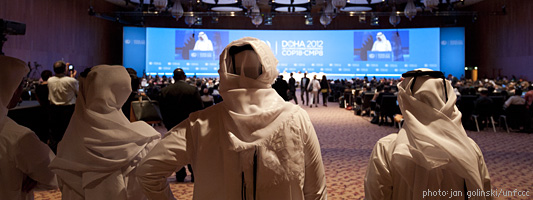
 0 Comment(s)
0 Comment(s) Print
Print E-mail China.org.cn, November 20, 2014
E-mail China.org.cn, November 20, 2014
 |
At the 2012 UN Climate Change Conference in Doha, Qatar (COP18/ CMP8), governments consolidated the gains of the last three years of international climate change negotiations and opened a gateway to necessary greater ambition and action on all levels. Among the many decisions taken, governments:
• Strengthened their resolve and set out a timetable to adopt a universal climate agreement by 2015, which will come into effect in 2020.
• Streamlined the negotiations, completing the work under the pdf-icon Bali Action Plan to concentrate on the new work towards a 2015 agreement under a single negotiating stream in the Ad hoc Working Group on the Durban Platform for Enhanced Action (ADP).
• Emphasized the need to increase their ambition to cut greenhouse gases (GHGs) and to help vulnerable countries to adapt.
• Launched a new commitment period under the Kyoto Protocol, thereby ensuring that this treaty's important legal and accounting models remain in place and underlining the principle that developed countries lead mandated action to cut greenhouse gas emissions.
• Made further progress towards establishing the financial and technology support and new institutions to enable clean energy investments and sustainable growth in developing countries.
The Urgency to Act
While there has been some success in climate change mitigation, global emissions of greenhouse gases continue to rise.
International action under the UNFCCC must be guided by the best available science. Increasingly frequent and progressively more severe impacts of climate change make the need for urgent action abundantly clear.
This is underscored by a growing number of reports, which have also provided options and solutions for the world to act effectively now to prevent much more serious climate change in the future. Most recent and upcoming reports include:
• The World Bank's "pdf-icon Turn Down the Heat: Why a 4°C Warmer World Must Be Avoided", showing that the world is on track towards a 4 degrees Celsius temperature rise, should the currently inadequate level of ambition remain.
• UNEP's Emissions Gap Report 2012, which demonstrated that it is still possible to bridge the emissions gap by 2020.
• The World Economic Forum's pdf-icon Global Risks 2013 report, released early in 2013. This report outlines a survey of more than 1000 experts polled on how they expect 50 global risks to play out over the next ten years. The report cites rising greenhouse gas emissions as one of the five major risks the global economy faces, and calls runaway climate change an X-factor that multiplies and exacerbates all risk.
• The Intergovernmental Panel on Climate Change (IPCC) will release its Fifth Assessment Report (AR5) in 2013 and 2014. The assessment will provide governments with the latest science on physics and impacts of climate change, and the scale of ambition necessary to successfully tackle climate change. The first installment of AR5 on the science is due this September, and the second and third installments are scheduled for release in March/April 2014. More info can be found on the IPCC website.
Go to Forum >>0 Comment(s)